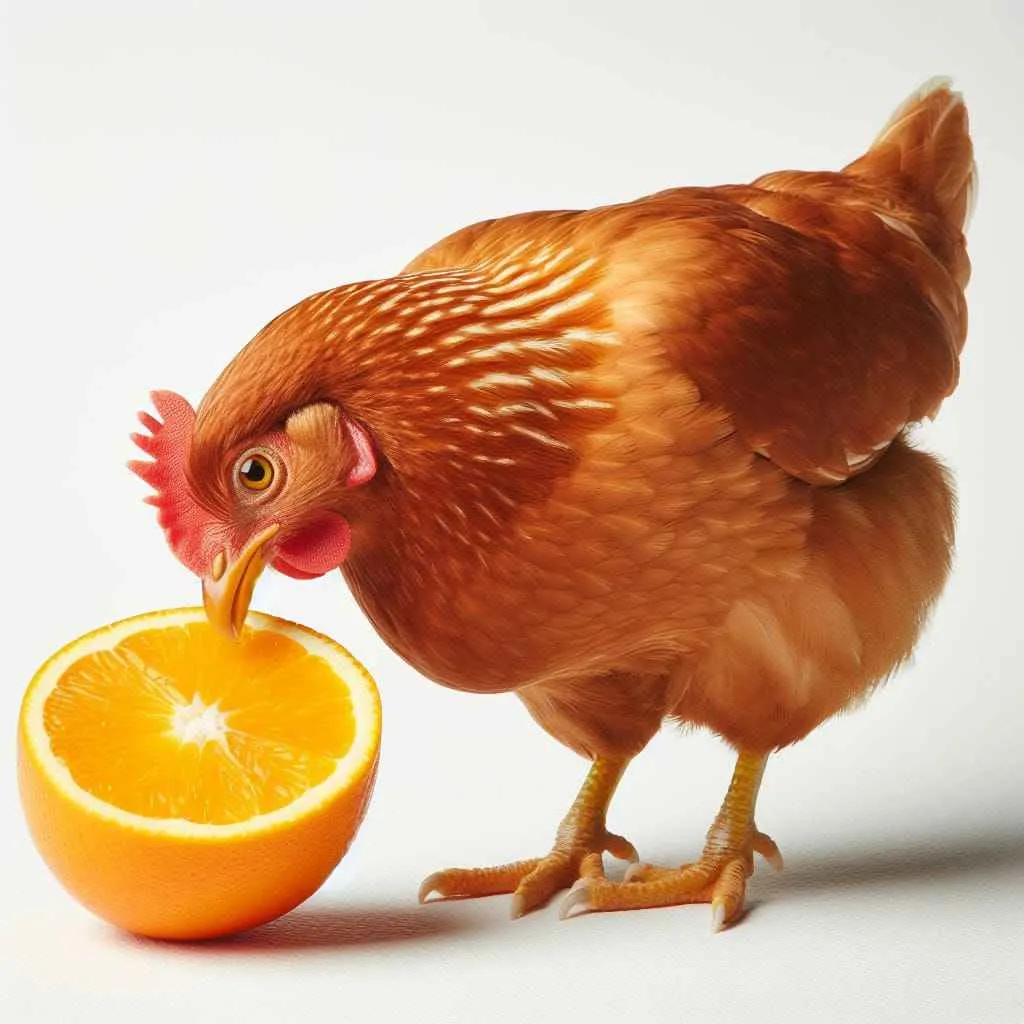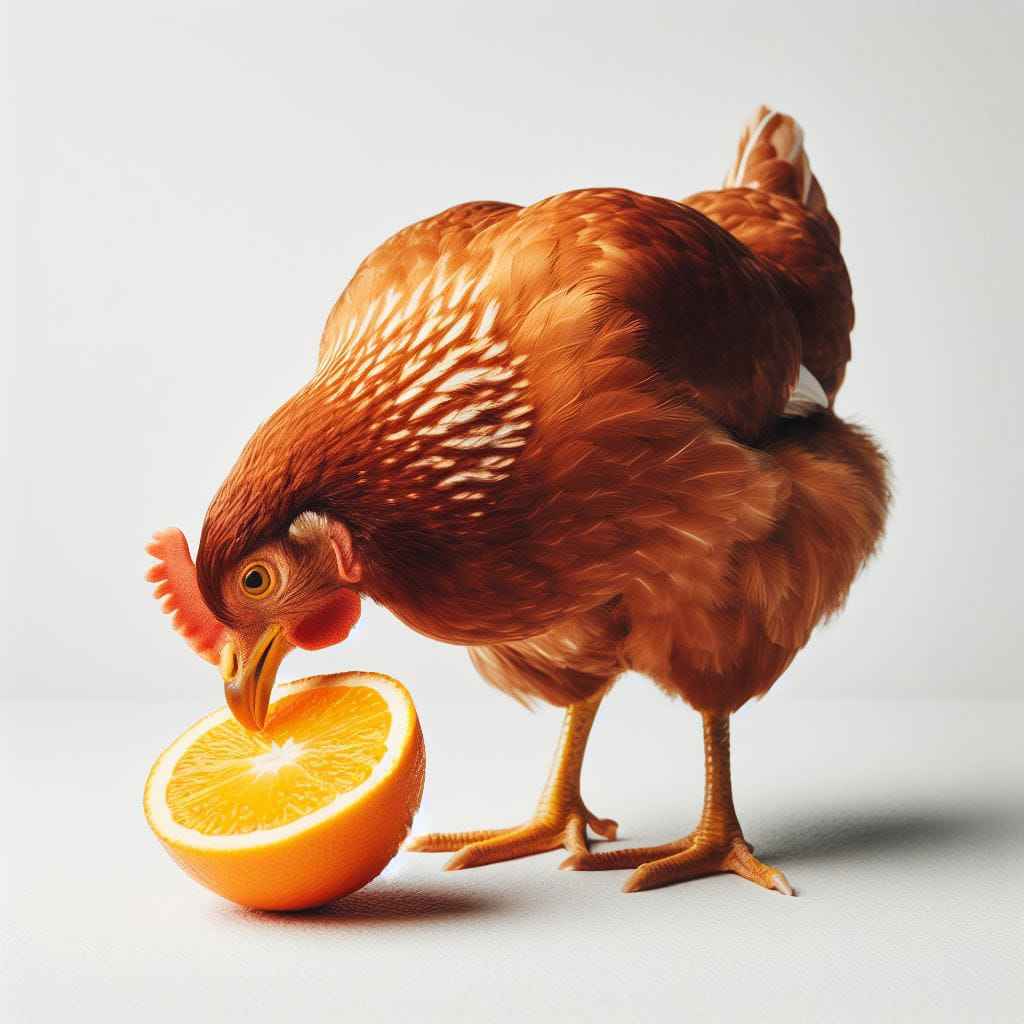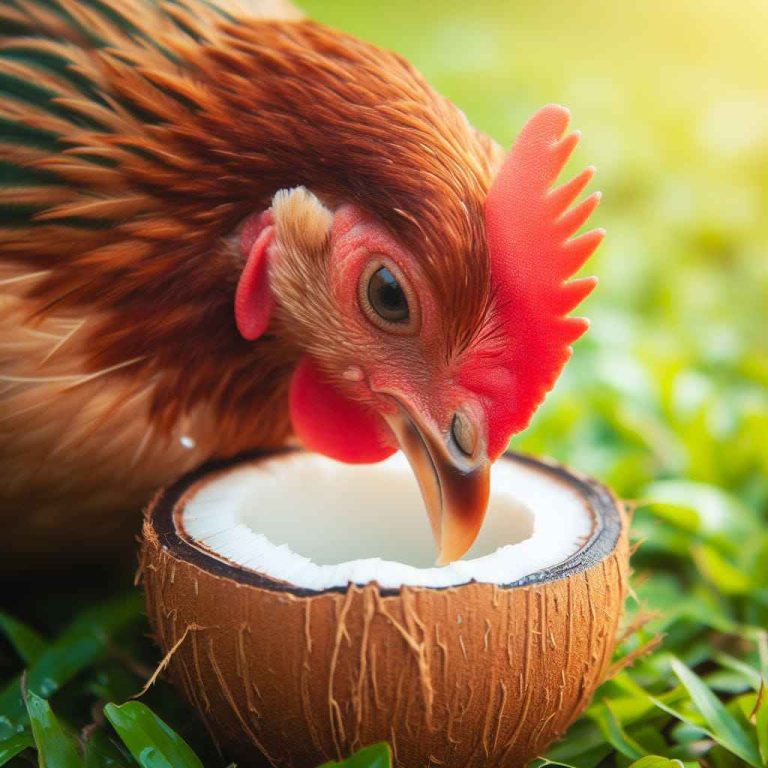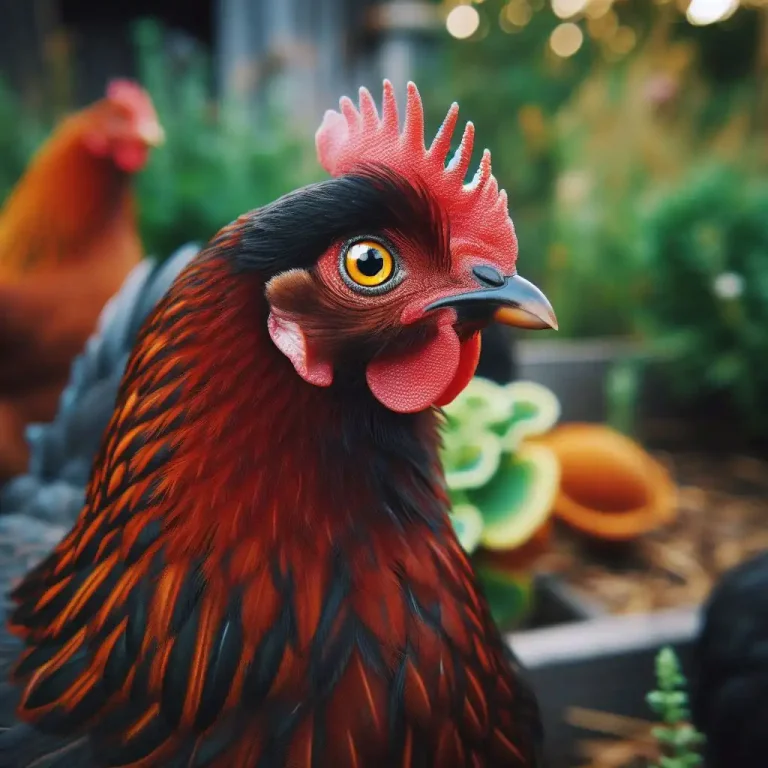Can Chickens Eat Oranges

Can Chickens Eat Oranges
Chickens are known for their diverse diet, happily pecking at grains, vegetables, fruits, and even insects. But what about oranges? Can these citrus fruits be included in a chicken’s menu? Let’s find out.
Nutritional Benefits:
Oranges are packed with vitamins and minerals, and chickens can benefit from their nutritional value. Oranges are particularly rich in vitamin C, which is essential for a chicken’s overall health and immune system. Additionally, oranges contain other vitamins like vitamin A and B-complex vitamins, along with minerals such as potassium and calcium. These nutrients support healthy growth and egg production in chickens.
Moderation is Key:
While oranges can provide valuable nutrients, it’s crucial to feed them to chickens in moderation. Too much citrus fruit can upset a chicken’s digestive system due to its acidic nature. Therefore, it’s best to offer oranges as an occasional treat rather than a staple part of their diet. A few small segments of orange per bird once or twice a week should suffice.
Potential Risks:
Despite their nutritional benefits, oranges do pose some risks for chickens. The high sugar content in oranges can lead to weight gain and other health issues if consumed excessively. Additionally, citrus fruits contain compounds that may cause digestive upset in some chickens. It’s essential to monitor your flock’s reaction when introducing oranges to their diet and to remove any seeds, as they can be a choking hazard.
Tips for Feeding Oranges to Chickens:
When offering oranges to your chickens, it’s best to slice them into small, manageable pieces to prevent choking. Remove any seeds or pits before feeding them to your flock. Remember to maintain a balanced diet for your chickens, incorporating a variety of foods to meet their nutritional needs.
In conclusion, chickens can indeed eat oranges, but it’s important to do so in moderation and with caution. When offered responsibly, oranges can be a delicious and nutritious treat for your feathered friends, contributing to their overall well-being and enjoyment.
Can chickens eat orange peels
Can Chickens Eat Orange Peels?
Chickens are known for their omnivorous diet, and they often enjoy a wide variety of foods, including fruits and vegetables. When it comes to oranges, many chicken owners wonder if their flock can safely consume the peels along with the juicy flesh. Let’s explore whether chickens can eat orange peels and the considerations to keep in mind.
Nutritional Content:
Orange peels, like the fruit itself, contain certain nutrients that can be beneficial for chickens. They are rich in fiber, which aids in digestion and helps keep the digestive system healthy. Additionally, orange peels contain small amounts of vitamins and minerals, including vitamin C, vitamin A, and calcium.
Potential Risks:
While orange peels offer some nutritional benefits, there are also potential risks associated with feeding them to chickens. One concern is the presence of essential oils in orange peels, which can be too strong for some chickens’ digestive systems and may cause irritation or upset stomachs. Additionally, the pesticide residue found on non-organic orange peels could be harmful to chickens if ingested.
Moderation and Preparation:
If you choose to feed orange peels to your chickens, it’s essential to do so in moderation and with caution. Start by offering small amounts of finely chopped or grated orange peels to gauge your flock’s reaction. Avoid feeding them large pieces or excessive amounts at once, as this could overwhelm their digestive systems.
Organic and Washed Peels:
Opting for organic oranges and thoroughly washing the peels before feeding them to your chickens can help minimize the risk of pesticide exposure. Organic oranges are grown without synthetic pesticides, reducing the likelihood of harmful residues on the peels.
Observation and Monitoring:
As with any new food introduced to your chickens’ diet, it’s crucial to observe their behavior and monitor for any signs of digestive upset or adverse reactions. If you notice any negative effects after feeding them orange peels, discontinue offering them and consult with a veterinarian if necessary.
Can chickens eat orange pulp
Yes, chickens can eat orange pulp in moderation. The pulp of oranges, which is the juicy, fleshy part inside the peel, contains many of the same nutrients found in the fruit itself. This includes vitamins such as vitamin C and vitamin A, as well as minerals like potassium and calcium.
Feeding orange pulp to chickens can provide them with additional hydration and nutrients, contributing to their overall health and well-being. However, it’s important to offer orange pulp in moderation, as excessive consumption can lead to digestive upset due to its high sugar content.
When offering orange pulp to chickens, it’s best to provide it as a treat rather than a staple part of their diet. You can offer small amounts of fresh or slightly mashed orange pulp as an occasional snack for your flock. It’s also essential to remove any seeds or large chunks of pulp that could pose a choking hazard to the chickens.
As with any new food introduced to their diet, it’s important to monitor your chickens’ reaction to orange pulp and watch for any signs of digestive discomfort. If you notice any adverse effects, such as diarrhea or lethargy, discontinue feeding orange pulp and consult with a veterinarian if necessary.
As with any new food introduced to their diet, it’s important to monitor your chickens’ reaction to orange pulp and watch for any signs of digestive discomfort. If you notice any adverse effects, such as diarrhea or lethargy, discontinue feeding orange pulp and consult with a veterinarian if necessary. You can find more information about what chickens can eat on websites like this one.
In summary, while chickens can eat orange pulp and may enjoy it as a tasty treat, it’s best to offer it in moderation and with caution. When fed responsibly, orange pulp can be a nutritious addition to your chickens’ diet and a source of enjoyment for your flock.

Can chickens eat orange rinds
Chickens can technically eat orange rinds, but it’s not recommended. Orange rinds, also known as peels or skins, contain essential oils and compounds that may cause digestive upset in chickens. These compounds can be too strong for their digestive systems and may lead to gastrointestinal issues such as irritation or upset stomachs.
Additionally, orange rinds can be difficult for chickens to digest due to their tough and fibrous texture. Consuming large pieces of orange rinds may pose a choking hazard to chickens, especially if they are not finely chopped or grated.
While some chickens may nibble on orange rinds out of curiosity, it’s best to avoid offering them as a regular part of their diet. Instead, focus on providing your flock with safer and more digestible treats, such as fruits like apples, berries, or melons, and vegetables like leafy greens or carrots.
If you do choose to offer orange rinds to your chickens as an occasional treat, it’s essential to do so in moderation and with caution. Start by offering small amounts of finely chopped or grated orange rinds to gauge your flock’s reaction. Monitor them closely for any signs of digestive discomfort or adverse reactions, and discontinue feeding orange rinds if any issues arise.
Overall, while chickens can technically eat orange rinds, it’s best to err on the side of caution and avoid offering them to your flock. Stick to safer and more digestible treats to ensure the health and well-being of your chickens.
Can chickens eat orange bell peppers
Yes, chickens can eat orange bell peppers. Bell peppers, including orange ones, are safe and nutritious for chickens to consume. They are rich in essential vitamins and minerals, including vitamin C, vitamin A, and potassium, which can contribute to the overall health and well-being of your flock.
Feeding your chickens orange bell peppers can provide them with a tasty and nutritious treat, as well as a source of hydration. You can offer them raw bell peppers by cutting them into small, bite-sized pieces or strips. Alternatively, you can cook the bell peppers before feeding them to your chickens, which can make them easier for the birds to digest.
It’s important to remember that while bell peppers are safe for chickens to eat, they should be offered in moderation as part of a balanced diet. Bell peppers should not replace the staple components of your chickens’ diet, such as poultry feed or grains. Instead, consider bell peppers as occasional treats or supplements to complement their regular diet.
As with any new food introduced to your chickens’ diet, it’s essential to monitor their reaction and watch for any signs of digestive upset or adverse reactions. If you notice any issues after feeding your chickens orange bell peppers, such as diarrhea or lethargy, discontinue offering them and consult with a veterinarian if necessary.
Overall, orange bell peppers can be a tasty and nutritious addition to your chickens’ diet when offered in moderation. Just be sure to cut them into appropriate sizes and monitor your flock’s response to ensure their health and well-being.
Are Oranges Safe for Chickens
Yes, oranges are generally safe for chickens to consume in moderation. Oranges are a good source of essential vitamins and minerals, including vitamin C, vitamin A, potassium, and calcium, which can contribute to a chicken’s overall health and well-being.
However, it’s important to feed oranges to chickens in moderation and with caution. While oranges can provide valuable nutrients, excessive consumption can lead to digestive upset due to their high sugar content and acidic nature. Chickens should only be given small amounts of oranges as an occasional treat, rather than as a staple part of their diet.
When offering oranges to chickens, it’s best to provide them in small, manageable pieces to prevent choking. Additionally, be sure to remove any seeds or pits from the oranges before feeding them to your flock, as these can be a choking hazard.
As with any new food introduced to a chicken’s diet, it’s essential to monitor their reaction and watch for any signs of digestive discomfort or adverse reactions. If you notice any issues after feeding oranges to your chickens, such as diarrhea or lethargy, discontinue offering them and consult with a veterinarian if necessary.
Overall, oranges can be a tasty and nutritious treat for chickens when offered responsibly. By feeding them in moderation and taking precautions to prevent choking hazards, you can safely incorporate oranges into your chickens’ diet as an occasional snack.
Nutritional Benefits of Oranges for Chickens
Oranges offer several nutritional benefits for chickens, making them a valuable addition to their diet when fed in moderation. Here are some of the key nutritional benefits of oranges for chickens:
- Vitamin C: Oranges are rich in vitamin C, also known as ascorbic acid, which plays a crucial role in supporting a chicken’s immune system. Vitamin C helps boost the production of white blood cells, which are essential for fighting off infections and diseases.
- Vitamin A: Oranges contain vitamin A, which is important for maintaining healthy vision, skin, and feathers in chickens. Vitamin A also supports proper growth and development, particularly in young chicks.
- Potassium: Oranges are a good source of potassium, an essential mineral that helps regulate fluid balance, muscle function, and nerve signals in chickens. Potassium is important for maintaining proper hydration and electrolyte balance.
- Calcium: While oranges are not as high in calcium as some other foods, they still contain small amounts of this essential mineral. Calcium is crucial for maintaining strong bones, eggshell formation, and muscle function in chickens.
- Hydration: Oranges have a high water content, which can help keep chickens hydrated, especially during hot weather or periods of high activity. Providing water-rich foods like oranges can contribute to overall hydration levels in chickens.
- Antioxidants: Oranges contain antioxidants such as flavonoids and carotenoids, which help protect cells from damage caused by free radicals. These antioxidants may have anti-inflammatory and immune-boosting effects in chickens.
- Dietary Fiber: Oranges contain dietary fiber, which aids in digestion and helps maintain healthy gut function in chickens. Fiber can also help regulate blood sugar levels and prevent digestive issues such as constipation.
Overall, oranges can provide chickens with a range of essential vitamins, minerals, and antioxidants, supporting their overall health and well-being. When fed in moderation as part of a balanced diet, oranges can be a nutritious and tasty treat for chickens to enjoy.

Potential Risks and Considerations
While oranges can offer several nutritional benefits for chickens, there are also potential risks and considerations to keep in mind when feeding them to your flock:
- High Sugar Content: Oranges contain natural sugars, which can contribute to weight gain and obesity in chickens if consumed in excess. Overfeeding oranges can also lead to digestive upset and diarrhea due to the high sugar content.
- Acidic Nature: Oranges are acidic fruits, which may cause digestive discomfort or irritation in some chickens, particularly those with sensitive stomachs. Feeding oranges in moderation can help mitigate the risk of digestive issues.
- Choking Hazard: Orange seeds and large chunks of pulp can pose a choking hazard to chickens if not properly prepared. Always remove any seeds and cut oranges into small, manageable pieces before offering them to your flock.
- Pesticide Exposure: Non-organic oranges may contain pesticide residues on the peel, which could be harmful to chickens if ingested. To minimize the risk of pesticide exposure, consider purchasing organic oranges or thoroughly wash the peel before feeding it to your flock.
- Allergic Reactions: Some chickens may be allergic to oranges or may have sensitivities to certain compounds found in the fruit. Monitor your flock closely after introducing oranges to their diet and watch for any signs of allergic reactions, such as itching, swelling, or difficulty breathing.
- Digestive Upset: Introducing new foods to a chicken’s diet can sometimes lead to digestive upset or diarrhea, especially if they are not accustomed to eating oranges. Start by offering small amounts of oranges and gradually increase the quantity over time to allow their digestive systems to adjust.
Overall, while oranges can provide nutritional benefits for chickens, it’s important to feed them in moderation and with caution. Monitor your flock’s reaction to oranges and watch for any signs of digestive discomfort or adverse reactions. By taking these potential risks and considerations into account, you can safely incorporate oranges into your chickens’ diet as an occasional treat.
Tips for Offering Oranges to Your Flock
When offering oranges to your flock, consider the following tips to ensure a safe and enjoyable experience for your chickens:
- Moderation: Offer oranges to your chickens in moderation as an occasional treat, rather than a staple part of their diet. Too much citrus fruit can upset their digestive systems due to its high sugar content and acidic nature.
- Small Pieces: Cut oranges into small, bite-sized pieces or slices to make them easier for chickens to eat and prevent choking hazards. Removing any seeds or pits beforehand is also important to avoid potential choking incidents.
- Gradual Introduction: Introduce oranges to your chickens’ diet gradually, starting with small amounts and increasing the quantity over time. This allows their digestive systems to adjust to the new food and reduces the risk of digestive upset.
- Observe Reactions: Monitor your flock closely after introducing oranges to their diet and watch for any signs of digestive discomfort or adverse reactions. If you notice any issues such as diarrhea or lethargy, discontinue offering oranges and consult with a veterinarian if necessary.
- Variety: Offer a variety of fruits and vegetables in addition to oranges to provide your flock with a balanced diet. This ensures they receive a diverse range of nutrients and prevents them from becoming too reliant on one type of food.
- Freshness: Choose fresh, ripe oranges for your chickens, as they will be more flavorful and nutritious. Avoid feeding them oranges that are overripe or spoiled, as they may cause digestive issues or attract pests.
- Hydration: Oranges have a high water content, which can help keep your chickens hydrated, especially during hot weather or periods of high activity. Offering oranges as a treat can contribute to their overall hydration levels.
- Supervision: Supervise your chickens while they eat oranges to ensure they are consuming them safely and to prevent any potential conflicts or injuries among the flock.
By following these tips, you can safely offer oranges to your chickens as a tasty and nutritious treat, enriching their diet and providing them with a source of enjoyment.
Can chickens eat oranges seeds
It’s generally best to avoid feeding chickens orange seeds. While small amounts of seeds are unlikely to cause harm, larger quantities may pose a choking hazard or cause digestive issues for chickens. Additionally, some citrus seeds contain compounds that can be toxic to chickens in large quantities.
To ensure the safety of your flock, it’s recommended to remove any seeds from oranges before offering them to your chickens. This reduces the risk of choking and digestive upset and allows your chickens to enjoy the nutritious fruit without potential hazards.
If chickens accidentally ingest a few seeds, it’s unlikely to cause harm. However, it’s still advisable to minimize their exposure to seeds whenever possible to prevent any potential health issues. Always supervise your chickens while they eat and monitor for any signs of discomfort or distress. If you notice any adverse reactions, such as difficulty breathing or unusual behavior, consult with a veterinarian for further guidance.
FAQs
While chickens can technically eat orange peels, it’s not recommended. Orange peels contain essential oils and compounds that may cause digestive upset or irritation in chickens. It’s best to avoid feeding them orange peels and instead offer the juicy flesh of the fruit in moderation.
The potential risks of feeding oranges to chickens include digestive upset due to their high sugar content and acidic nature. Additionally, orange seeds and large chunks of pulp can pose choking hazards to chickens if not properly prepared. Pesticide residues on non-organic oranges may also be harmful to chickens if ingested.
Oranges should be fed to chickens in moderation as an occasional treat, rather than a staple part of their diet. Offering oranges once or twice a week in small amounts is sufficient to provide them with a tasty and nutritious snack without overloading their digestive systems.
Yes, there are several alternatives to oranges that chickens can safely consume, including other fruits like apples, berries, melons, and bananas. Vegetables such as leafy greens, carrots, cucumbers, and bell peppers are also nutritious options for chickens.
While oranges are generally safe for chickens to eat in moderation, other citrus fruits like lemons, limes, and grapefruits should be avoided. These fruits are much more acidic and may cause digestive issues or irritation in chickens. It’s best to stick to oranges or other non-citrus fruits when offering treats to your flock.






